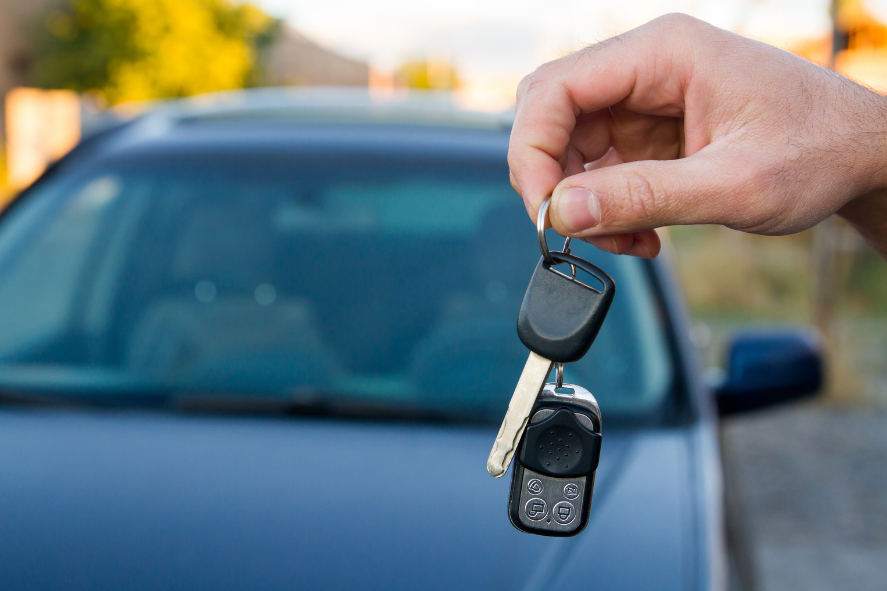Losing a set of car keys only seems to happen at the most inconvenient moment. Just as you’re trying to rush out the door with the children packed and ready for school, you suddenly get a sense of all-encompassing fear - I haven’t seen the car keys for a while.
That initial fear can quickly turn to mounting panic the longer the search goes on, and it’s easy to start rushing around like a headless chicken, opening the microwave and checking inside the washing machine (as if it would be there).
Keeping your calm during this situation can make a huge difference - whether you eventually find your keys or need to start the process of getting replacements. This article guides you through 10 simple steps to help you regain access to your vehicle and some tips on improving key security.
1. Stay Calm and Retrace Your Steps
The initial reaction to losing something as important as car keys is often blind panic. However, it's important to stay calm, think clearly and recall the last locations where you had them. This is an obvious and sometimes annoying piece of advice others give when you’re frantically looking for something, but when you stop and take the time to think, it can really help.
Common Places to Check
Begin by checking the most common places where keys are often misplaced. Look through your pockets and any bags you recently used. Consider checking tables, counters, and other surfaces where you might have set them down. Sometimes, keys end up in the most unexpected places, so it's worth checking the car itself in case they are inside or nearby.
2. Identify Your Car Key Type
When the realisation dawns that your keys are well and truly gone, it’s important to move on to the next steps quickly and not wallow in grumpiness. If you’ve really misplaced them, complaining about it too much isn’t going to help.
Car keys come in various forms, each with a unique feature, and understanding the type of key you've lost is essential, as it determines the steps required for replacement.
-
Traditional Mechanical Keys
These are the simplest forms of car keys, typically used in older vehicles. They don't have electronic components, making the replacement process straightforward.
-
Transponder Keys
Introduced in the 1990s, these keys contain a microchip that communicates with the car's ignition system. Replacing a transponder key involves cutting a new key and programming the new chip.
-
Keyless Entry Remote Fobs
These fobs allow you to lock and unlock your car doors without using a physical key. Replacing a fob requires programming it to match your car's security system.
-
Smart Keys
Smart keys offer advanced technology, allowing you to start your car while the key is in your pocket. Replacing a smart key involves complex programming and synchronisation with your vehicle's security system.
-
Switchblade Keys
These keys feature a foldable design where the metal key flips out from the fob. Replacement involves both cutting the key and programming the fob.
-
Laser-Cut Keys
With a more intricate design and enhanced security features, laser-cut keys require precision equipment for duplication. They may also include a transponder chip, requiring additional programming. It's not an easy - or cheap process.
3. Contact an Automotive Locksmith
The good news - it’s always good to look for the silver lining, right? - is that this type of loss happens all the time, which means plenty of professionals are on hand to help. Automotive locksmiths specialise in replacing and programming car keys and are often a quicker and more cost-effective option compared to dealerships.
Finding a Reliable Locksmith Service
Research local locksmiths with good reviews and check for any necessary certifications. Recommendations from friends or family can also help you find a trustworthy service..
Required Services for Key Replacement
The services you need from a locksmith will depend on your key type. Cutting a new key might suffice for traditional keys, but programming will be necessary for more advanced keys and can take significantly longer.
If you’re not entirely sure what kind of key you have, you can usually describe it to the locksmith along with the make, model, and year of your car, and they’ll typically have a pretty good idea of what you have. Alternatively, use a service like Auto Key with a make and model search.
4. Check Your Car Insurance Policy
Some motor insurance policies cover the cost of replacing lost keys, so review your policy details to see if you're covered. If you’re not, but think this could be a good addition, make a note to contact your policyholder and see if you can add it later.
Claiming Key Replacement on Insurance
If your policy covers lost keys, contact your insurer to start the claim process. Be prepared to provide any required information or documentation to support your claim.
Most likely, you’ll be able to start the process by contacting a locksmith and then have the cost reimbursed by your insurance provider afterwards, but it’s always best to check the specifics.
5. Use Your Spare Key
This step can obviously come much earlier. Having a spare key can remove the short-term angst of needing to use the car but not having the original key - but it still needs replacing. You're skating on thin ice once you’re relying entirely on the backup.
6. Understand the Cost of Replacement
The cost of replacing car keys can vary widely based on the type of key and the services required.
Cost Factors for Different Key Types
Traditional keys are generally the least expensive to replace. In contrast, smart keys and keyless fobs can be more costly due to the advanced technology and programming involved. Costs vary from business to business, but you’re probably looking at between €30 and €150, depending on what you need.
7. Prepare Necessary Documentation
When seeking key replacement services, you'll likely need to provide some documentation for obvious reasons. To prove that this is actually your car, you’ll need:
- Proof of identity
- Proof of Vehicle ownership
- Any other required documents
8. Implement Key Loss Prevention Strategies
To avoid the stress of lost keys in the future, consider implementing strategies to keep better track of them. Nobody’s a saint, and we’ve all lost important things over the years, but trying to get into good habits can minimise the chance of losing your keys in the future. It makes sense, really.
Effective Strategies to Avoid Future Losses
Here are a few of the best strategies:
- Use technological aids like Bluetooth trackers and key finders
- Organising keys in a designated spot - a key rack or a specific drawer are always good options (if you can remember to put them there)
- Routine checks - This may seem a little childish, but if you’re a repeat offender, it might work well
9. Consider Keyless Options for Future Security
Upgrading to keyless entry and ignition systems can offer enhanced security and convenience, reducing the risk of key loss.
Benefits of Keyless Entry and Ignition Systems
These systems provide improved security features, such as encrypted signals and the convenience of not needing a physical key to access and start your vehicle. If you frequently lose keys or other important items, this could be the perfect solution for you.
However, there are a few potential drawbacks to having keyless entry:
- Hacking – Though rare, keyless entry could be vulnerable to hacking
- Signal interference – Keyless devices rely on radio frequencies that can sometimes cross over with other devices nearby
- Forgetfulness – Forget to lock doors, and anyone can gain entry - although most cars have an automatic lock after a few minutes
- Technical issues – More complex systems mean more that can go wrong
10. Explore Insurance and Breakdown Cover Benefits
Comprehensive insurance and breakdown cover can offer added peace of mind, including key loss protection. Consider policies that include coverage for key loss and theft. If it’s an option, it might be worth paying a little extra for it.
Learn More About Comprehensive Cover at 123.ie
There’s no other way to look at it. Losing your car keys is a massive pain. Depending on your current situation and vehicle needs, it can cause havoc to your plans. In an ideal world, we can all easily avoid losing such vital items, but that might be wishful thinking.
The best we can do is to minimise the risk by getting into good habits and having a comprehensive car insurance policy with a lost key feature behind us. We rarely think about key loss coverage until that shot of panic surges through us - when it does, you’ll be glad 123.ie is just a telephone call away.





